#stereotypical literature major
Text
I did a genderbend Dante cosplay for Halloween lol
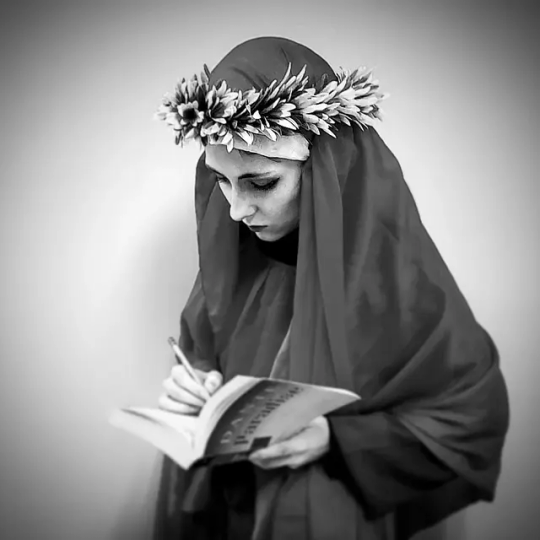
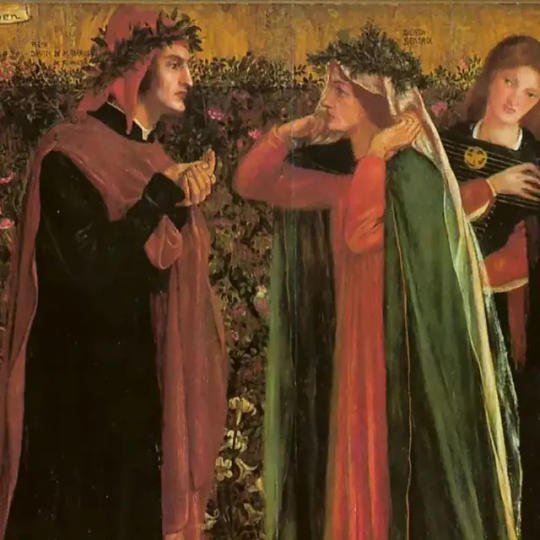
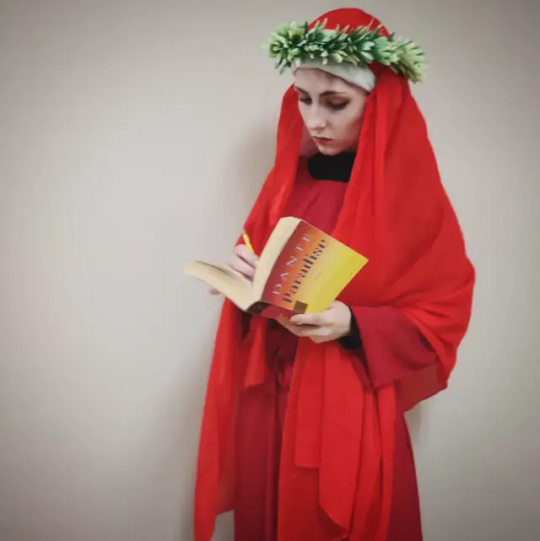
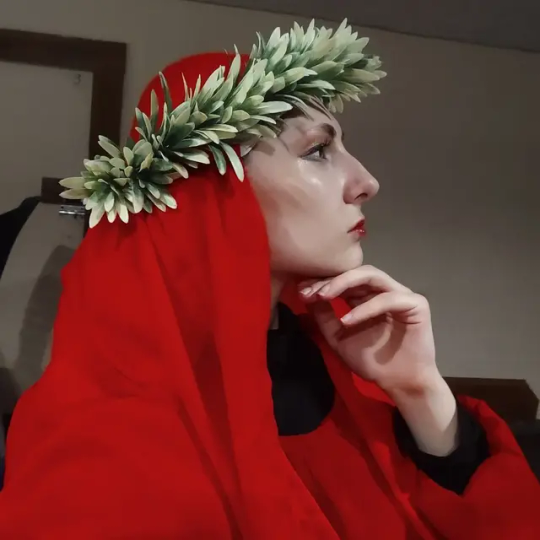
#dante alighieri#dante#cosplay#la divina commedia#divina commedia#literature#stereotypical literature major#italian#italian literature#italia#sillyposting#hehehe#medieval
169 notes
·
View notes
Text
59 minutes until my war against last year's terf English prof begins again
#un-fucking-cool i have to take this course in order to graduate#she made my first semester of english major hell#supposed to be a class about adaptations and she turned it into demonizing Johnny Cash#hated the way i thought#god the way she talked about Katniss Everdeen#'ooh she's only masculine to demonstrate how only men can survive'#'if district 12 weren't struggling she'd be more of a stereotypical woman like her mom and prim'#swore id never take her course again#but because this is Canada i have to take a canadian literature course#and the only one available this semester is hers#if i didn't take it i won't graduate#so i gotta buckle in and grit my teeth for 14 weeks of her nonsense#and i know she's gonna remember me cause I was the only one who called her out on shit#Adventures In English Major
4 notes
·
View notes
Text
Seeing how society treats kids who want an art-related career is really sad, especially when you’re an art related major
kids are often discouraged from having an art-related job by their family, counselors, etc. and often go on to either live unfulfilling lives with jobs they’re not even partially interested in or find their way back to their original art-related passion much later in life
so glad i didn’t listen to my mom <3
#what sparked this?#i'm doing a research project on starving artists and how accurate the stereotype is#this is really important to me since i AM a literature major
2 notes
·
View notes
Text
Observations of the Mercury placements
This is kind of like a pt.2 to the mini observations of the moon signs that I posted to my second account. I would’ve posted this there but I honestly don’t think i’ll make anymore astrology posts on that account. I’ll link it for those who want to see :) Mini observations of the moon signs. I might add more onto this as time goes on :D

Mercury in 5H may be very interested in art, history, literature ect.
Mercury in 5H also know how to have a good time, like literally, they make conversations so fun and easy, esp for people who struggle to continue conversations.
Mercurial dominants are for some reason similar to uranus doms imo. However Uranus is more about change and revolution meanwhile mercury is more intellect and personal power.
Mercurial dominants are really easy to spot, they’re very eccentric yet sophisticated. They look all over the place but put together at the same time. They’re really unique individuals.
Mercury in Cancer relies on past experiences/knowledge to help them in tough situations.
I noticed they may find it hard to improvise on the spot. And though Cancer mercurians do have strong intuition, it’s hard for these individuals to decipher whether it’s intuition or if they’re overthinking it.
Mercury in 4H may write/create deep and emotional pieces that can resonate with a lot of people and their childhoods.
Mercury in Cancer at an Aries degree might come off as petty or vengeful. I know many cancer mercuries that have an Aries degree on it, and god these people like drama 😭
Mercury in Aquarius could be into alternative/grunge music.
Not to be stereotypical or anything, but taurus mercuries/mercury in the 2H do have very beautiful voices. Even if they don’t believe it themselves, their voices are so soothing to hear, they sound poised and elegant lol.
Scorpio mercuries analyse EVERYTHING. Every small thing, they will dissect and uncover istg. They’re also good at getting to the root of a problem in any dynamic/situation. This is due to their good analysis skills as well as emotional intelligence.
Mercury in 10H, similar to 1H, look like smart individuals. Except unlike the first house, mercurial qualities aren’t apart of their personality (unless ofc they have a virgo/gemini rising, major mercurial influence) Mercury in 10H individuals look smart and put together when out in public but people who are close to them know they are actually really scatter brained🙏
Mercury in Capricorn have dry humour, and i love it. They are very sarcastic individuals and I love them for it.
Mercury in 11H individuals are social butterflies even if they don’t think so themselves. They always manage to get on peoples good sides without even doing anything.
Mercury in 11H can manifest easily through communication, writing and visualisation.
Yeah. Libra mercuries are very balanced people. Mentally at least. They really do want the best for everyone and want a fair playing field for all. These individuals could be heavily involved in protests for equal rights, and they enjoy bringing attention to things that need to be talked more about in society.
Libra mercuries are also really funny people, ESP IF THEY HAVE AQUARIUS PLACEMENTS!!
Mercury in 12H could come off as very shy people. Of course this is dependant on the sign mercury is in and the aspects made to it, however I noticed most Mercury in 12H at first really come off as quiet.
Mercury in 12H also may be very detached mentally. They could be more attached and grounded in their imagination. These are the types of people who have dreams that really drain them in their waking life. It’s like their dreams have a huge mental impact on them. Ik many ppl with this placement who use a dream journal as well.
imo the most emotionally/intellectually mature mercury placements are scorpio/cancer/aquarius/taurus mercuries, 8H/3H/10H Mercuries and Moon-Mercury, Jupiter Mercury aspects
Leo and Gemini mercuries are so cool istg. I love how vibrant you guys are when you talk. Leo is very entertaining to listen to (this highkey applies to sagittarius mercury as well) and they’re just so funny to watch LMAO. Many Gemini mercuries I have met are actually really jittery and like move a lot when they talk, lots of them barely hold eye contact with me either it’s so cute. Some of them actually may struggle with speaking out loud in front of people but they are extremely talented writers.
Interest in writing/Talented at writing = Venus/Moon/Mercury/Jupiter in 3H as well as Sun/Venus/Moon/Jupiter conj Mercury.
I also feel like Saturn in 3H may enjoy writing but they may have struggled a lot with english or communication as a kid but grew to like it as they aged.
this is a very random assumption I just made, but maybe saturn in 3H have really well structured writing ? I feel like they would be really good at essay writing and exam prep, because they won’t go off topic or anything, they can keep things short and concise while also describing things in detail.
Meanwhile Venus in 3H may have a very soft and delicate writing style. The words they use are unique and really paint a picture inside the readers mind.
Mars 3H might be good at persuasive writing/speeches. Could be good at making eye catching advertisements, good catch phrases, y’all should get into marketing or sumn.
Fixed mercuries are the types to stand up strongly for what they believe in and i admire this wholeheartedly.
3H Moon may have lots of writing pieces that are perceived as very emotional and deep.
Uranus in 3H may be interested in and good at all types of writing. They get bored of sticking to one topic so they may struggle writing essays.
Pluto 3H may have very dark ideas that they can easily put onto the page. Traumas they have experienced, or any issues that they have in their lives can be written in a beautiful manner by these individuals.
Ok im done with my 3H/writing tangent 😭
Maybe this is just me, but i notice you attract a lot of individuals with mercury placements that are extremely similar to yours. For example, many of my friends have Cancer mercuries, I am a cancer mercury myself. I have a 3H mercury and I attract a lot of people who have mercuries in air houses, no matter the sign. (Air houses = 3H/Gemini, 7H/Libra, 11H/Aquarius)
Mercury-Neptune I feel is similar to 12H Mercury, these individuals could have very vivid imaginations, ones that they easily can get lost in.
I feel as though many people misinterpret mercury in 12H/Neptune-mercury’s words.
Capricorn Mercuries have a really monotone sounding voice ? Think text-speech voice on tiktok but more human like ?? 😭 I MEAN THIS IN A GOOD WAY. Because they have a very ‘matter of fact’ type of voice it makes me want to listen to them and take whatever they’re saying seriously. I’m on the floor for you guys atp, if I have to, I will lower my standards for you
Mercury in 4H may have been seen as the smart child in the family.
Mercury in 4H may also write really deep literature/lyrics that resonates with many individuals childhoods.
Mercury in Sagittarius, are blunt in the best way possible. Mercury in Sag are really good at explaining things and giving advice as well. (This is esp true if their mercury is in an earth house, ie. 2H/6H/10H)
Many Mercury in Sag individuals are also powerful speakers, this is because many people with this placement in my generation have their Mercury conj Pluto.
Mercury in Taurus take a while to learn things, this does not mean they are slow in the head, actually quite opposite. They’re very strategic and work at their own pace, and even though to others it seems like they’re taking their sweet time, they are building up a lot behind the scenes and turn out to be ones that are the best in their profession. Definition of work smart not hard. Plus they do all of this in such a aesthetically pleasing way 😭
Mercury in 8H can make very beautiful and meaningful art. Whether it be music, paintings, literature, makeup and fashion, they always know how to reach deep within themselves and pour out the most authentic work.
As a 3H Mercury and Gemini Venus, I LOVEE Sag mercuries/9H Mercury placements/Mercury-Jupiter. I always learn something new from these individuals and they’re like my other half. My bestfriend has this placement and even though we’re quite different, we’re very mentally compatible for each other. She takes in information, analyses it, then spews it out for me to learn and understand. This is the best way I can describe it🙏
Gemini-Sag Mercurial placements (Any sag/gemini placements tbh) = teacher/student dynamic, in the least weird way possible LMAOO.
Pisces mercury individuals are very, very imaginative people. Esp when placed in the 11/5H. Pisces mercury in 11H makes these individuals big dreamers who daydream about the things they constantly want. Pisces mercury in 5H daydream about new and different things that they think are fun and may struggle to commit to one single idea/creative outlet.
Mercury in Aries are so authentically themselves. They don’t talk/say things to please other people, they say it because they want to. They always rely on their mind in the end, very independent individuals.
Mercury in 7H could be very relationship oriented and constantly are wanting to please others
Fixed mercuries are stubborn in terms of their beliefs and mindset. I’ve noticed these individuals find it hard to to analyse situations from another perspective as their opinion on the matter is what matters most. Out of all fixed signs though scorpio and Aquarius seem to be more open minded.
Cardinal Mercuries are the ones to speak up in class and actually raise their hands when everyone else is too afraid to.
Mutable mercuries, understandably are the individuals with the most easy going mindset. They find it easy to accept others beliefs even if those beliefs are highly criticised. Though, this does have its downside as mutable mercuries may change their opinions often and struggle to form strong opinions on different things in life.
Virgo mercuries may be very organised when speaking. They could overthink before even saying anything, so they go over everything and make sure that what they’re going to say is well structured and makes sense.
People who have Mercury in the 1st house look smart. Like i’m telling you every single person I’ve met who has this placement, look extremely punctual and intelligent.

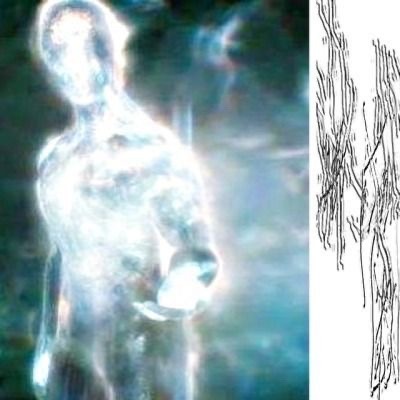
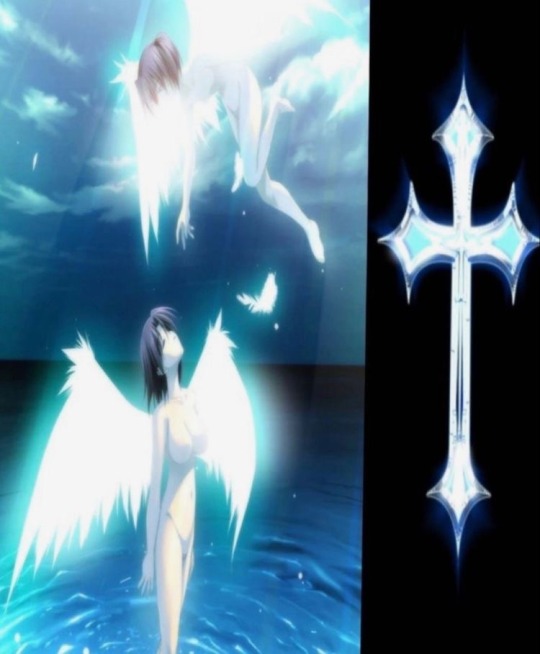
#astro community#astrology placements#astrology notes#astrology community#astro notes#astrology#astro tumblr#astroblr#astrology observations#mercury astrology#astrology mercury#mercury placements#aries mercury#taurus mercury#cancer mercury#pisces mercury#leo mercury#sagittarius mercury#aquarius mercury#capricorn mercury#virgo mercury#gemini mercury#scorpio mercury#libra mercury#astrology aspects#astrology houses#astrology tumblr#astrology degrees
3K notes
·
View notes
Text
During the hundred years of new Jewish settlement in Palestine, whose starting point is conventionally assigned to 1882 (and commonly called "the First Aliya"), a society was produced whose nature and structure proved to be highly fluid [...]. Each new wave [of immigrants] resulted in a restructuring of the whole system. It is, however, commonly accepted that around the time of the establishment of the State of Israel, in 1948, a relatively crystallized Jewish society existed in Palestine with a specific cultural character and a high level of self-awareness, as well as established social, economic, and political institutions. It differed, culturally and otherwise, from the old Jewish, pre-Zionist Palestinian community, and from that of Jewish communities in other countries. Moreover, this distinctiveness was one of its major goals, involving the replacement of the then-current identifications "Jew" and "Jewish" with "Hebrew." [...]
[...] [T]he cultural behavior of immigrants oscillates between two poles: the preservation of their source culture and the adoption of the culture of the target country. [...] Most migrations from England tended to preserve the source culture. European immigrants to the United States at the end of the nineteenth century, on the other hand, left their home countries with the hope of "starting a new life in the new world" [...]. [This slogan's] effect was to encourage the replacement of the "old" by the "new" and often engendered attitudes of contempt towards the "old." Such replacement assumes, of course, the existence of an available cultural repertoire in the target country [...]. [...] [I]t is precisely here that the case of immigration to Palestine stands in sharp contradistinction to that of many other migrations. A decision to "abandon" the source culture, partially or completely, could not have led to the adoption of the target culture since the existing culture did not possess the status of an alternative. In order to provide an alternative system to that of the source culture, in this case East European culture, it was necessary to invent one.
The main difference between most other migration movements and that of the Jews to Palestine lies in the deliberate, conscious activity carried out by the immigrants themselves in replacing constituents of the culture they brought with them with those of another. [...] Zionist ideology and its ramifications (or sub-ideologies) provided the major motivation for immigration to Palestine as well as the underlying principles for cultural selection, that is, the principles for the creation of an alternative culture. [...] [T]he governing principle at work was "the creation of a new Jewish people and a new Jew in the Land of Israel," with emphasis on the concept "new."
At the end of the nineteenth century, there was sharp criticism of many elements in Jewish life in Eastern Europe. Among the secular, or semi-secular Jews, [...] Jewish culture was conceived to be in a state of decline, even degenerate. There was a notable tendency to dispense with many of the traditional constituents of Jewish culture. The assimilationists were prepared to give up everything; the Zionists, in the conceptual tradition of the Haskala, sought a return to the "purity" and "authenticity" of the existence of the "Hebrew nation in its land," an existence conceived according to the romantic stereotypes of contemporary (including Hebrew) literature, exalting the primordial folk nation. It is interesting to note that both assimilationists and Zionists accepted many of the negative Jewish stereotypes, promulgated by non-Jews, and adapted them to their own purposes. Thus they accepted at face value the ideas that Jews were rootless, physically weak, deviously averse to pleasure, averse to physical labor, alienated from nature, etc., although these ideas had little basis in fact.
Among the numerous ways manifested for counterposing "new Hebrew" to "old Diaspora Jew" were the transition to physical labor (mainly agriculture or "working the land," as it was called); self defense and the concomitant use of arms; the supplanting of the old, "contemptible" Diaspora language, Yiddish, with a new tongue, colloquial Hebrew (conceived of at one and the same time as being the authentic and the ancient language of the people), adopting the Sephardi rather than the Ashkenazi pronunciation; discarding traditional Jewish dress and adopting other fashions [...]; dropping East European family names and assuming Hebrew names instead.
[...] [E]xperiments were continuously carried out in Palestine to supply the components necessary for the fulfillment of the basic cultural opposition new Hebrew-old Jew. It was not the origin of the components which determined whether or not they would be adopted, but their capacity to fulfill the new functions in accordance with this opposition. Green olives, olive oil and white cheese, Bedouin welcoming ceremonies, and kaffiyehs all acquired a clear semiotic status. The by now classical literary description of the Hebrew worker sitting on a wooden box, eating Arabic bread dipped in olive oil, expresses at once three new phenomena: (a) he is a worker; (b) he is a "true son of the land"; (c) he is not eating in a "Jewish" way (he is not sitting at a table and has obviously not fulfilled the religious commandment to wash his hands).
— Itamar Even-Zohar, "The Emergence of a Native Hebrew Culture in Palestine, 1882-1948." Studies in Zionism 4, 1981. DOI 10.1080/13531048108575807.
131 notes
·
View notes
Text
The Ultimate Test (MarkLee Oneshot)

Synopsis: In which you hear that Mark Lee, a cocky classmate from college, is a bad kisser, so he personally offers to prove you wrong.
wc: 3,3k
genre: party au!; university au!; slightly suggestive
You didn't used to come to parties like this. Well, at least not on weekdays. Definitely not when you had a Calculus 3 exam in a couple of days to worry about. However, the pleading eyes of your three best friends who couldn't bear to see you go through the whole grueling college experience without going through the whole drinking-and-partying stereotypical college thing managed to convince you this time.
And you were thankful to have a little black strapless dress tucked away in the back of your closet for specific situations like this. And you were also grateful when your friends offered to pay for your Uber - after all, being an university student also brought with it the unhappiness of lack of money and the small joy of when you get something for free.
You just weren't very grateful when you realized that you barely spoke to those people at the party and your friends had "very important" things to do, which included kissing and boys, and didn't include you staring at them while all of this was going on. Of course, this was expected, and you didn't want to be a party-pooper, so you just started walking around and drinking a few shots of beverages you weren't exactly interested in knowing what were. Again, it was for free.
Your slight shyness wasn't limiting or controlling, but it was certainly a bit inconvenient. More than once a few good-looking guys came up to talk to you, but your clumsiness simply drove them away within a few minutes. Damn.
And now here you were: listening to incredibly loud music in a modern mid-century house that you didn't know who it belonged to - or if it was a fraternity, or anything like that - with a glass of drink that you didn't know what it was, eyeliner that you could swear would melt at any moment with the human warmth around you, a little black dress that had already gone out of fashion and an uncontrollable urge to do something outrageous, just so you could distract yourself from the fact that normally at that time you would either be sleeping or freaking out about the imminent calculus exam. "Damn that motherfucking calculus," you thought, "I'm at a party."
On the other side of the large, high-ceiling living room, a group of recognizably slightly annoying boys were playing beer pong while dozens of girls surrounded them. All of them were engineering students, except for their leader, Mark Lee, who was the most disturbing of the seven and was a literature major (which in some way that was incomprehensible to you, attracted a lot of girls) and he obviosuly took advantage of this, which was visible by the girl leaning loosely on his waist at this very moment.
— YES! — Haechan, one of them, shouted over the loud music as he hit the ping-pong ball into a glass of beer. Mark cracked his neck twice before picking up the glass and drinking until the very last drop, defeated.
You stared at him as he shrugged and grimaced before returning the glass to the table and flashing a smile at everyone in the game, preparing for his turn to throw the ball.
It wasn't that he wasn't handsome, or attractive. Yes, he was. And he didn't fall short on either count. You could understand why he was so chasen after by the girls on campus. It's just that you'd had the opportunity to have a few dialogues with Mark Lee, and they were all pretty unpleasant. There was something about his manner, his attitude, that you just couldn't endure. He was irritating. Smug. Sloppy. And you don't have time or patience for that.
He then flexed his arm, his biceps visible thanks to his tank top, and threw the ping-pong ball, but someone blocked your view just in time to watch him hit the cup.
— You won't believe what I've just found out! — Jennie, one of your three cheeky friends, appears smiling and clearly altered. — Mark Lee is a total soft kisser!
— What? — You almost scream, startled by the sudden mention of the boy you've been shamelessly watching for the past few moments. And even worse: worried about how your friend had acquired this information.
— I'm serious! — She laughed out loud, bending her body forward and knocking some of what looked like a fruit cocktail out of the glass in her hand. You sidestep cautiously, but some of the pink liquid still splashes on your legs. — Lin said they kissed earlier in the evening, and he barely even moved! Can you believe that?
You laugh at the irony of the facts. That was valid information to share. You feel a bit bad for Lin, your classmate, but honestly? You wouldn't trade knowing that for anything.
Of course, Mark, the most conceited person who ever lived, would be the type to talk a lot and do nothing. Was there anything more coherent than that? Absolutely not!
Your laughter joins Jennie's, and you both enjoy the gossip for a while. Suddenly, Katy Perry's "Teenage Dream" starts playing through the dozens of speakers scattered around the house and you and your friend stare at each other, wide-eyed, as your laughter stops.
— THAT'S OUR SONG! — You shout at the same time. Jennie pulls you by the arm to the most spacious part of the room, where everyone was dancing, and you let yourself go for the first time all night.
The lively melody and beat combine with the rhythm of your heart, and not much later you can hardly feel the world around you. Tests, lack of money, shyness or cocky boys, none of it mattered. The few drinks you've consumed so far finally seem to take effect, and with every song you play, your body feels looser and your mind feels farther away.
Not long after that, a tall, muscular guy starts to whisper something to Jennie, who smiles back shyly. You realize that maybe this is your cue to take a break from the dance floor to grab another drink and finally quench your thirst caused by the sudden exercise.
You see the familiar counter full of disposable cups and bottles of all kinds on the other side of the hall, in what appears to be a dining room combined with a kitchen that is now full of young people and very messy. It's easy to let yourself imagine what that environment would look like if it weren't in its most chaotic state: perhaps a cozy house or a shared-house of intelligent students. But right now, that was just the alcohol talking.
As soon as you reach the counter, you grab a plastic cup and fill it with what looks like a clear alcohol - perhaps a vodka, or gin - topped off with a generic soft drink from the other side of the counter. That mix will be enough at the moment to keep you from passing out from the alcohol, but it won't let the dance sober you up again either.
The first sip brings the sweetness of soda and the bitterness of strong alcohol down your throat.
— Vodka. That's for sure. — You conclude to yourself, looking at the cup in your hands.
— I thought you were some kind of female-hermit or something. — A voice pulls you out of your little dialog with the inanimate object in your hands, and you look up to see the person on the other side of the bar, only to roll your eyes deeply.
— That' not even a thing.
But Mark Lee just shrugs, filling his own cup with what looked like a brownish liquor.
— You get the idea. — He smiles and tilts his head, stopping to watch you. His eyes scan along your little black dress and you suddenly feel embarrassed by all the attention you're getting. He just lets out a muffled laugh, probably noticing the way you flinch slightly, and walks away with his drink - not without turning around and giving you a wink, which you answered with a frown.
After the not-so-pleasant appearance of the cocky college student, you remember the funniest piece of information of the evening: "Mark Lee is a total soft kisser!". Of course! He could be as arrogant as he wanted around you or any other girl, but you knew what he really was. You knew his secret. And he may have walked out of there thinking he'd rocked it, or that he'd made you uncomfortable as usual, but it was you who had won your little dispute. After all, you're going to have the last laugh.
…🎉…
A few more drinks away and no word from your friends. The small anger you had felt towards Mark had been transmuted into an important mission to tell almost every girl you knew there about the new gossip you had been entrusted with.
You were at a stage in your drinking where your conscience was no longer so affected - so you could tell that your actions were the result of a real desire to unmask the most annoying guy you knew. Of course, the drink made you bold enough to carry out the plan, but the rest was all yours.
— So… Mark Lee, do you know who that is? — You were excitedly telling Lane, a girl from your business class. Lane nodded, curious. — The rumors are that…
She then arched her eyebrows, looking past you. Unfortunately, or not, you didn't exactly notice that.
— He's a very bad kisser! — And then you started laughing for the nth time that night, thinking about how funny that was and hoping for a good reaction from your colleague.
— Oh really? And how do you know that? — A voice echoes from behind you and you feel your spine freeze. Lane stares at you and the person behind you alternately, getting a front view row of your giant screwup.
"Shit", you thought before turning to face the known voice owner.
— Mark. — It's all you can say. You try your best not to show the shame of having been caught in such a…vulnerable moment. The brunette just stared at you intensely, arms crossed in front of his chest and a deadly look in his eyes. You don't let yourself be intimidated this time, and give him an ironic look in return.
— Funny you should be saying that, hermit.
— Funny that you're a literature student and yet misuse that word.
Okay, that wasn't your best take at the moment. But it was all you could think of as a response. You wait for a laugh from Mark, or anything else that would reveal his smug spirit - or that would show that he had been shaken by your comment about the kiss.
However, he just takes a step forward, still with his arms crossed, coming dangerously close to you and tilting his head and shoulders in your direction, to look you right in the eye as he says:
— Who did you call a "bad kisser" again? — He teases, starting to crack a sly smile. — Why don't you kiss me to prove who's the bad kisser?
You swallow a lump in your throat, not knowing what to say. That's right, it seems that his idiotic manners had appeared in the worst possible way, and now it was up to you to make things right, even though you felt nervous and your stomach twisted with a feeling you didn't understand where it was coming from.
Suddenly, a flash of confidence came over you. And there, staring at your nemesis' frowning eyebrows and the nonchalant way in which he crossed his well-shaped arms, with that stupid grin on his face and a growing challenge in his gaze, you understood what was happening to you.
Damn it, you want to kiss Mark.
Of course you don't want to give him a taste of being right, or yet another reason for him to think he's the man. Of course you don't want to hurt your own pride, and you'd hold on to it like your life depended on it.
But you also wanted to be able to test that gossip you'd heard earlier that evening. And you also wanted the taste of knowing that you'd totally destabilized that arrogant man. You wanted to see the look of surprise on his face when you accepted his proposal, or would he be… satisfied? Or bewildered? All the options seemed alluring in your imagination.
And you wanted to. Oh, you really did. You really wanted to kiss Mark Lee.
— Prove me wrong, then. — You boldly held the gaze of the boy who was testing your patience so much these past weeks. Your smile gradually widened as you watched his mouth slowly open in confusion.
Oh, he hadn't expected that.
Mark's eyebrows drew together and he seemed to search for words. His posture stretched, and the shadow of his body moved away from you.
— Wait, what did you say? — He pointed to his own ear and then to his surroundings, indicating the muffled sound of the party music. His face showed, however, that he had heard very well - he just wanted to make sure he wasn't hallucinating those words.
— Prove. me. wrong.
— What the actual f… — He practically whispered, but you could understand the words just by watching the movement of his lips. Mark's gaze in your direction was puzzled and surprised, but not in a childish way. He stared at you as if he were really trying to understand what on earth could be happening to you at that moment.
So, without letting him think too much about your sudden acceptance, you took the boy's wrist in one hand and began to lead him out of there.
— Let's find somewhere to go. — You said, with an assurance that had never come through your voice before, which Mark seemed to like. Then he took the lead himself, gently leading you through the party with the calm of someone who seemed to have done it many times before - and he probably had. You mentally thanked him, because if you had to continue with your little confident act, your knees might have given out. Or your stomach would explode. Something in between.
Suddenly, Mark stopped in front of a door, already on the second story of the house. You didn't even notice how your feet made it all the way up the stairs, but they did. The brunette opens the door, but not before turning to look at you one last time, trying to make sure that was happening.
He enters the room before you and turns on the light, making you realize that it was a rather narrow bathroom. Your heart beats rapidly before you take the final steps towards that unexpected destination.
You enter and close the door behind you. Mark leans lazily against the wall opposite to the sink, facing the bathroom mirror. He takes a deep breath, looks at the floor with a sly smile and says:
— I thought you hated me… — But you don't let him finish, because you quickly stand in front of him and put both hands behind the back of the head of the boy you hated. You see Mark's eyes widen one last time as he is interrupted, before you can bring your lips together in a rushed kiss.
Your nervous fingers run through the end of Mark's hair, which seemed freshly cut and slightly spiky. You smiled into the kiss at the tickling sensation, while he barely had time to react to your attack.
Then, when he finally understands, Mark pulls you close, holding your waist with both hands and spreading his legs to fit you between them. His grip is firm but still, as if he's nervous.
You continue to enjoy the moment, moving according to the rhythm between you, but always wanting more. The air in the bathroom seems increasingly thin, but the chaos of your mind barely lets you notice. You leave Mark's lips to make a trail of kisses between his chin and neck, hearing him sigh above you. You feel the warmth of his skin, and the short trails of freshly shaved beard on his face.
It's only when Mark gently pulls his face away and leans his forehead against yours, pausing to take a deep breath, that you realize he's barely had time to think.
— Okay, hasty. — He lets out a weak laugh between sighs. — Now it's my turn.
Without letting you answer - and in a classic revenge move - Mark leans over until you have to walk backwards. His steps are short, but they work until your back hits the sink counter. His exposed arms encircle you, holding you firmly on the worktop as he brings his body closer to yours until you're completely touching.
You let out an exclamation before he presses your lips together again, this time taking the lead.
Mark's lips feel like uncharted territory, as this time he takes control. His kiss is firm, but not at all restrained. Slowly, you feel one of his hands rise from the counter and run down your spine from the base to the nape of your neck, tracing it with his fingers and leaving you extremely sensitive. At the nape of your neck, Mark's hand fiddles with your hair, precisely catching the strands in a ponytail that he pulls back slightly.
His index finger makes a few deft turns through the strand, twisting it until it is completely in his grasp. He squeezes your strands with a force that doesn't hurt, but makes you grunt into the kiss - which he answers with a smile.
Still enraptured by the unexpected movements, you barely notice when Mark's two hands gather around your thighs, pushing them up until you're sitting on the sink counter and he has to tilt his head slightly to avoid breaking the kiss. The ease with which he had lifted you, and without pulling away. Oh my God.
Jennie's words about Mark seem further and further away, as if they had been in another life. They also seem, fortunately or not, untrue.
"Lin said they kissed earlier in the evening, and he barely even moved! Can you believe that? ", you hear your friend's voice in your head. Oh, no… Lin must have been completely out of her mind.
But there's barely time to think about anything outside that 4x1 bathroom. Or at least not when Mark is running his tongue lightly over your lower lip before moving on to your neck. The warm breath against your cold skin sends shivers down your spine, and you wriggle under the boy's grip - which still hasn't left your thigh.
With no time to lose, you pull back on the back of Mark's neck to press your lips together again, and he seems to love it.
For a few more moments, you exchange hurried kisses and firm squeezes, until Mark's kiss begins to slow down, becoming even more attractive. The movement of your lips, so sure and certain, gradually stops, until he leaves a few lingering kisses and rests with your faces close together.
— I think you've proved me wrong. — You say, in a whisper, then let out a muffled laugh, unable to stop smiling.
— That's a shame… — He begins, tilting his head with a sideways smile. — Because if you weren't convinced, I'd have to keep proving it to you.
You face each other directly, and you can't help but roll your eyes at his comment, and then say:
— Mark Lee, you're an incredibly bad kisser.
— That's exactly what I wanted to hear. — He mumbles and moves closer again. You can still hear him let out one last dry, drawn-out laugh before closing your eyes and surrendering to the darkness.
#nct fanfic#nct imagine#nct x leitor#nctzen#mark lee#nct mark#mutual pining#fluff#fluffmarklee#markxreader#mark lee fanfic#nct dream#nct 127#nct scenarios#fem reader#reader insert#party au#university au#fratboy!mark#slightly suggestive#mark scenarios#making out#kiss#cocky mark
84 notes
·
View notes
Text
Accusing people, some of whom incidentally are likely LGBT themselves, of not viewing wol///fstar as canon because they "can't read queer-coding" is the cope of the century and borders on delusional. it's also condescending and disrespectful- why is your personal analysis of a work of fiction more valid than anyone else's, particularly when that analysis is almost certainly driven by confirmation bias? Have you asked yourself whether the "signs" you think you're reading in the text are actually there or whether you just want them to be? It's fine to want them to be and to add two and two and get six, personally I've done that with many works of fiction and I will continue to do so, but objectively there's no evidence that holds up to the slightest bit of scrutiny that jkr actually intended Sirius and Remus to secretly be in love.
Leaving aside the fact for now that this is JKR we're talking about and all that entails, it honestly verges on conspiracy-brained at times. Besides that, using homophobic stereotypes as "evidence" is, to put it plainly, shit. Some of these stereotypes might seem fairly innocuous yet still manage to be offensive (e.g. "tonks is queer-coded because she has short hair/is cool/has this personality trait or physical characteristic) but others honestly cross a line. Think for a moment about the logical leap you're making when you claim that werewolves being an allegory for stigmatised illnesses like AIDS is proof that R is gay. What equivalence is being drawn here? worth thinking about
I just want to say this is a work of children's literature and we're all free to interpret whatever we want and make up whatever silly things that we want with it. But you're not smarter or more special than anyone else because you think there's a gay way to look or speak or act, or for seriously believing that JKR created some kind of mad convoluted mental backflip conspiracy to specifically fuck with what was at the time a fringe element of online fandom that she likely wasn't even aware of. Apply Occam's razor here and go with the simplest explanation, which is that JKR, a heterosexual woman, wrote a children's book in the 90s with a majority heterosexual pairings and one token gay character. From there, do whatever you want. The end
#theyre channeling larrys at this point. likeits tjlc vibes in here#i say token but i wish grindledore was more of a thing in fandom like grindledore rise. my toxic boys r right there#wolfstar critical#<<< its not really because its not about the ship itself. hopefully thats clear. but jic#'tonks is gay bc she's cool' when will peeople learn that gay people can actually be like. any sort of person on the planet.#it's not that there aren't signals that exist in the community but turning that around and#genuinely believing that the presence of ultimately neutral characteristics tht can appear in any sort of person#is evidence for being gay is... not the serve u think it is#and besides! its lame uncool gay people erasure!
100 notes
·
View notes
Text
How to Pick The Perfect Weapon For Your Characters

When you’re writing a novel every small element has its own purpose. From the lush setting to the intricate plot, each detail is carefully chosen to convey a message, evoke emotions, and immerse readers in the narrative. One such crucial element is the character's weapon.
A character’s weapon is their best friend, sometimes even literally in cases like Magnus Chase. This seemingly insignificant tool can be a symbol of their essence, values, and role in the story. This is why it’s so essential to pick the right weapon!
As an author of both thriller and SFF, I decided to create a quick guide to help you learn how to pick the perfect weapon for your characters.
Swords: The Symbol of Honor and Valor
Swords have long held a special place in the realm of storytelling. They are the embodiment of honor, valor, and the chivalric code. Whether it be thriller, action, or even romance, stories have sported brave princes and knights bearing swords from decades. Characters who wield a sword are perceived as strong, determined people with a willingness to make sacrifices for their cause.
Some writers often associate swords with the main male protagonist, however, this weapon would be a great fit for any character who is perceived as a force to be reckoned with. The cliche prince on a horse with a shiny sword might paint a clear image, but don’t limit yourself to literary stereotypes.
Types of Swords
Contrary to popular belief swords come in various shapes and sizes, each with its unique attributes.
Longswords: These versatile weapons are known for their balance, allowing for precise strikes and powerful swings. Longswords are often associated with knights and heroes. These are the type of swords a typical prince would wield.
Katanas: Elegant and deadly, katanas are the traditional swords of Japanese samurai. They represent discipline, precision, and the way of the warrior. Katanas are also often used by antagonists.
Rapiers: Slim and agile, rapiers are the choice of swashbucklers and duelists. They symbolize finesse, quick thinking, and style in combat.
Ideal Characters
If you’re finding it difficult to decide whether or not your character should wield a sword, here are some personality traits and physical qualities to go off of:
Courage: Swordsmen and swordswomen are brave, unafraid to confront danger directly.
Honor: They uphold a strong sense of morality and adhere to a code of ethics. However, this also applies to antagonistic characters who often fail to see the flaws in their ways.
Chivalry: Sword-bearing characters display manners, respect, and hold themselves to high regard.
Physical Prowess: Proficiency in swordplay demands agility, strength, and dexterity, this usually comes with a fit if not lean physique. If your character is more of a brute then swords might not be the best pick for them.
Examples in Literature
Throughout literary history, swords have been embraced by iconic characters. You have chivalrous heroes like the legendary King Arthur wielded the mythical sword Excalibur, a symbol of his destiny and nobility. However, there are also notable villains such as Luke Castellan from Percy Jackson.
Luke’s character starts off as a minor protagonist who is akin to a mentor figure but he slowly turns into a major antagonist. Many people often associate swords with protagonists, however, they can also be used by powerful antagonists with a strong mindset who are determined to have their way.
When crafting a character who wields a sword, consider these attributes and the symbolic weight that comes with this choice. Swords are not just weapons; they are embodiments of valor and the unwavering spirit of your characters.
Daggers: The Stealthy and Cunning Choice
In the world of weaponry, daggers hold a unique allure. These swift blades are the embodiment of stealth, cunning, and the art of silent confrontation. When a character wields a dagger, it signifies their mastery of subtlety, their ability to navigate the shadows, and their readiness to strike with precision when the moment is ripe.
Unlike swords, daggers have been used more uniquely throughout literature and are wielded by various character types. However, they are often associated with the sarcastic quick-witted characters or quiet calculative ones.
Types of Daggers
Daggers come in various forms, each tailored for a specific purpose:
Stilettos: A stiletto's slim, needle-like design is tailor-made for covert operations. It's the weapon of choice when subtlety and concealment are paramount, often associated with assassins and spies.
Dirks: Dirks are the Swiss Army knives of the dagger world. Their broad blades enable both offense and defense, making them versatile companions for characters who value adaptability.
Throwing Knives: Characters who wield throwing knives are the sharpshooters of the dagger realm. Their skill lies not just in close combat but in launching these deadly projectiles with uncanny accuracy.
Twin Daggers: Twin daggers, a pair of symmetrical blades, represent a double-edged approach to combat. Characters who favor this style emphasize agility, dual-wielding techniques, and the element of surprise.
Ideal Characters for Dagger-Wielding
Characters who favor daggers share a distinct set of traits and characteristics:
Stealth and Evasion: Dagger-wielding characters excel in the art of remaining unseen and slipping through the tightest of spots.
Cunning and Strategy: They rely on their wits, strategy, and clever tactics to outmaneuver opponents who might possess greater physical strength.
Resourcefulness: Daggers are versatile tools that require characters to adapt to their environment. Whether in a dimly lit alley or a sun-drenched courtyard, they use what's at hand to gain an advantage.
Quick Reflexes: In close combat, precision and agility are essential. Dagger-wielders are known for their ability to react swiftly to changing circumstances.
Examples in Literature
In the realm of literature, characters who master the art of daggers often exude enigma and resourcefulness. Unlike sword-wielders who are seen as flashy and bold, those who use daggers are capable of slinking through the shadows and using their weapon to sneakily complete their tasks.
Arya Stark from George R.R. Martin's "Game of Thrones" series is a great example of this. Arya's journey is intrinsically tied to her slender dagger, Needle. It becomes an extension of herself, embodying her resilience and resourcefulness.
Another example would be the assassins in the "Assassin's Creed" series. These stealthy characters employ an array of daggers for precise and silent takedowns, epitomizing the cunning and agility associated with this weapon.
Crafting a character who wields a dagger opens up possibilities for intrigue, stealth, and the art of subterfuge.
Axes: The Brute Force of the Battlefield
Axes, with their sheer power and imposing presence, are the weapons of characters who favor raw strength and ferocity on the battlefield. These formidable tools are more than mere instruments of destruction; they symbolize the unyielding force that some characters bring to their quests and conflicts.
Unlike the other weapons listed in this blog post, axes are possibly the only weapon where I would advise you to go with the stereotypical ‘big, strong person’ image associated with this weapon. This is because axes are impossible to wield on a regular basis by someone who isn’t physically capable of handling their weight.
Types of Axes
It is common knowledge that axes come in various forms, each designed for specific purposes, but here are the most common types of axes used in literature:
Battle-Axes: These massive, double-bladed weapons are designed for cleaving through armor and enemies alike. They are the embodiment of relentless strength and often used by the antagonist’s henchmen or guards.
Hatchets: Hatchets are compact, one-handed axes known for their versatility and practicality. They are often associated with survivalists and woodsmen.
Tomahawks: Tomahawks are single-handed axes with a historical significance, representing both tools and weapons for Native American characters.
Ideal Characters
As I mentioned above, there are certain traits associated with characters who use axes that you would be better off following. However, that is not to say you have to go along with the stereotype to the T. Think of characters like Hagrid, who fits the physical and mental requirements for an axe-wielder yet is portrayed as a loveable character.
Some traits you should keep in mind to use as a reference point for axe-wielders are:
Bravery: Axe-wielding characters are unflinchingly brave, charging headlong into battles without hesitation.
Ferocity: They are known for their unrestrained aggression and determination in combat. However, they can also be quiet and keep to themselves in daily life.
Physical Might: Proficiency with axes demands exceptional strength and endurance.
Resilience: Axe-bearers can endure heavy blows and keep pressing forward.
Examples in Literature
In literature, characters who wield axes are often forces to be reckoned with. They’re those powerful characters that leave a lasting impact on your readers. Think of characters like Thor, Brienne of Tarth and Gimli.
While this weapon is generally associated with magical beings like dwarves and giants you could also have fun with it. Maybe a hot-headed female elf prefers using an axe rather than swords and bows like her peers, or a princess could have picked up on how to use a hatchet while watching the guards train.
Remember, axes represent not only power but also the indomitable will to face adversity head-on.
Bows and Arrows: Precision and Patience
In the realm of weaponry, few choices demand as much finesse and discipline as the bow and arrow. These elegant yet deadly weapons are the preferred tools of characters who value precision, patience, and the ability to engage their enemies from afar. As the arrow leaves the bowstring, it represents not only a physical projectile but also a testament to the archer's skill and the unwavering focus required for this art.
Types of Bows
Archery encompasses a range of styles, each offering unique advantages and reflecting the character of the archer:
Longbows: Known for their simplicity and sheer power, longbows have been used by legendary archers throughout history. Drawing a longbow requires considerable strength and skill, making it the choice of archers who value raw force and accuracy.
Compound Bows: Modern archers often favor compound bows, which employ a system of pulleys and cables to provide mechanical advantage. This design makes them easier to draw and hold at full draw, ideal for hunters and those who value both accuracy and ease of use.
Recurve Bows: Recognized by their gracefully curved limbs, recurve bows store and release energy efficiently. These bows are versatile, often used in competitive archery where precision and consistency are paramount.
Crossbows: Crossbows are handheld devices that offer unique advantages, particularly in terms of precise aiming and ease of use. Archers who value accuracy and a quick reload often choose these weapons.
The Ideal Archer
Characters who become proficient with bows and arrows exhibit a distinctive set of attributes and skills:
Patience: Archers are masters of patience, waiting for the perfect moment to release their arrow, whether in the heat of battle or during a hunt.
Precision: They possess an uncanny aim, able to consistently strike distant targets with pinpoint accuracy.
Stealth: Archers can engage their enemies from a concealed vantage point, using the environment to their advantage.
Stamina: Drawing a bow requires not only finesse but also physical strength and endurance, especially when handling longbows.
Examples in Literature
In the world of literature, characters who master the art of archery often personify these traits:
Katniss Everdeen from Suzanne Collins' "The Hunger Games" series is the perfect example of a typical archer. Katniss's skill with a bow becomes a symbol of her survival and resilience in a dystopian world, her weapon is something she can rely on and trust. It isn’t as flashy or bold as some of the other characters’ weapons, however, her weapon’s, often-overlooked, proficiency helps her overcome her opponents.
Another good example would be Legolas from J.R.R. Tolkien's "The Lord of the Rings" trilogy. Legolas, an elf archer, is renowned for his exceptional accuracy and agility, traits that make him a formidable member of the Fellowship.
When crafting a character who wields a bow and arrows, delve into their temperament, motivations, and the patience required for their style of combat. Bows and arrows represent not only precision but also the ability to strike with calculated efficiency from a distance.
Magical Weaponary: Enchanted Tools
Magical implements, imbued with mystic energy, are the tools of wizards, witches, and characters who harness the arcane forces of magic. These enchanted objects represent not only power but also the mastery of spells, incantations, and the unseen forces that shape their world.
Types of Magical Weaponary
Magical implements can take various forms, each with its unique properties and associations:
Wands: Wands are slender instruments often associated with precision spellcasting. The type of wood and core material can influence their magical properties.
Staffs: Staffs are longer and more robust than wands, often associated with wizards and sorcerers. They provide greater control over magic and are sometimes used as a support in physical combat.
Orbs: Enchanted orbs or crystals are used for scrying, divination, and channeling magical energy. They are linked to foresight, vision, and mystical insight.
Runestones: Characters who use runestones possess knowledge of ancient symbols and magical scripts. These stones are often used for inscriptions and rituals.
Amulets and Talismans: These enchanted jewelry pieces provide protective or augmentative effects to the wearer. They can be worn as necklaces, rings, or bracelets.
Ideal Characters
Characters who wield magical implements typically possess specific traits and qualities:
Magical Aptitude: Wielders of magical implements have an innate or learned mastery of magic, allowing them to cast spells and manipulate mystical forces.
Intellect: Magic is a craft that requires knowledge and intelligence, and characters with magical implements often excel in both.
Discipline: Effective spellcasting demands discipline and concentration, traits exhibited by wielders of magical tools.
Morality: The ethical choices made by characters with magical implements can impact their magical abilities and alignment.
Examples in Literature
Picking the right magical instrument for your character can either be very easy or difficult depending on the extent of magic bearers in your book. If your book is akin to Harry Potter you can simply pick one magical weaponry and assign it to a group of characters. Maybe your wizards and witches use wands while your warlocks use staffs.
However, in a book like J.R.R. Tolkien's "The Lord of the Rings" series, where you have one specific magic bearer like Gandalf, you would have to pay more attention to the type of weapon you assign to your character. Gandalf's staff is not only a tool for his magical abilities but also a symbol of his wisdom and power. If you were to assign a wand to a character like Gandalf it wouldn’t have the same air of sagacity as a staff.
Modern Firearms: Technology and Precision
Modern firearms represent a significant departure from traditional weapons, harnessing technology and precision to deliver deadly force with incredible efficiency. These weapons are the choice of characters in contemporary settings, from gritty crime dramas to action-packed thrillers.
Firearm Types
Modern firearms encompass a range of types, each tailored to specific purposes. I’m sure you can find a more detailed list anywhere online but here’s a quick list of the basic types.
Handguns: Pistols and revolvers are compact, concealable, and ideal for close-quarters combat or self-defense. They require steady aim and quick reflexes.
Rifles: Rifles are versatile long-range weapons known for their accuracy and power. They are favored by marksmen, snipers, and characters who need to engage distant targets.
Shotguns: Shotguns deliver a spread of pellets, making them devastating at close range. They are often used in home defense scenarios and for hunting.
Automatic and Semi-Automatic Firearms: These firearms offer rapid-fire capabilities, making them suitable for characters facing multiple adversaries or engaging in intense gunfights.
Ideal Characters
Characters who wield modern firearms possess specific attributes and training:
Firearm Proficiency: Proficient characters are well-trained in firearm use, understanding safety, reloading, and maintenance.
Mental Toughness: They must maintain composure under pressure, as firearms can be unforgiving in high-stress situations.
Training and Experience: Characters may have military or law enforcement backgrounds or undergo specialized firearm training.
Mindset: The choice to use firearms can reflect a character's willingness to employ lethal force when necessary.
Examples in Literature
In literature, characters who wield modern firearms are often found in genres like crime fiction, espionage thrillers, and action-adventure novels:
Jesper Fahey from Leigh Bardugo's "Six of Crows" is a sharpshooter with a passion for firearms. He brings a unique blend of humor, charm, and unerring accuracy to the crew of skilled criminals known as the Dregs. Armed with his trusty revolvers, Jesper showcases not only his prowess with firearms but also his quick thinking in high-stakes situations.
Jesper's character reflects the complexities of using firearms in a gritty, high-risk world. His marksmanship skills not only contribute to the crew's endeavors but also serve as a storytelling element, illustrating the fine line between life and death in their dangerous heists.
I think he’s a great example of the type of character readers would typically associate with loud flashy firearms.
Unconventional Weapons: Creativity and Surprise
unconventional weapons are like hidden treasures waiting to be unearthed. They offer writers a canvas upon which to paint unique and memorable characters. These characters don't just march to the beat of their own drum; they make their own drumsticks, turning the ordinary into the extraordinary.
Whips, Chains, and Musical Instruments
When you think of weapons, whips and chains might not be the first things that come to mind. Yet, in the hands of a skilled writer, they become symbols of precision, control, and the unexpected. A whip's crack can be as powerful as any gunshot, and the rattle of chains can send shivers down spines. And what about musical instruments?
The sweet melody of a flute can lull enemies into a false sense of security before revealing its true potential as a weapon. Writers have the freedom to explore these unconventional choices, creating characters who surprise, enthrall, and captivate readers.
Creativity Knows No Bounds
Unconventional weapons are a playground for creativity. Writers can let their imaginations soar, crafting characters who wield items that defy convention. Whether it's a character fashioning a weapon from the environment or turning a seemingly mundane object into a deadly tool, the possibilities are endless.
Want your hero to use a bouquet of roses as a weapon? Go for it. How about a character who wields a garden gnome like a hammer? Let your creativity run wild. Rachel Elizabeth Dare threw a hairbrush at a titan, Alice uses a flamingo as a croquet mallet. When it comes to unconventional weapons, you really don’t have any limits.
I hope this blog on How to Pick The Perfect Weapon For Your Characters will help you in your writing journey. Be sure to comment any tips of your own to help your fellow authors prosper, and follow my blog for new blog updates every Monday and Thursday.
Looking For More Writing Tips And Tricks?
Are you an author looking for writing tips and tricks to better your manuscript? Or do you want to learn about how to get a literary agent, get published and properly market your book? Consider checking out the rest of Haya’s book blog where I post writing and publishing tips for authors every Monday and Thursday! And don’t forget to head over to my TikTok and Instagram profiles @hayatheauthor to learn more about my WIP and writing journey!
#hayatheauthor#haya's book blog#haya sameer#haya blogs#writers on tumblr#writer community#writer tools#writer blog#writer stuff#writer wednesday#writer tips#creative writing#writers of tumblr#writerscommunity#writeblr#writing community#writer spotlight#writer things#writing prompt#writing tools#writing stuff#writing#writing life#writing inspo#writing help#writing advice#writing inspiration#writing ideas#writing things#writing tip
181 notes
·
View notes
Text
Lore: Life in Faerûn, Part 1
Disclaimer & Other Stuff
[tldr: D&D lore is a giant conflicting mess. Larian's lore is also a conflicting mess. You learn to take what you want and leave the rest]
Abeir-Toril
Why it's called the "Forgotten" Realms
History | Time & Festivals | Lexicon [1] [2]| Languages | Living in Faerûn [1] [?] | Notable Organisations | Magic | Baldurs Gate | Waterdeep | The Underdark | Geography and Human Cultures
---[WIP]
---
Demihumans in common society (ie human society); common is not a daily language; the postal service; some stuff about gender, gender roles and body modification in the Realms; social strata... Plus some details about other things - most of which will be built on in other posts.
Also featuring; what to do with your leisure time in the realms: like literature, theatre, cafés, where to go clubbing aaand the festhalls.
Education: church school, rich idiots at academies, bardic colleges, etc.
And how good medicine is on Toril, if you can't find a spellcaster to heal you. Baths are both mandatory and freely available, we shall have no unwashed peasants in this setting.
-----
Humans are the dominant peoples of the Realms, and the vast majority of cultures one will find oneself in are human cultures. Nine-in-ten people are human, with the one remainder being one of any of the eight non-humans (some of whom are more commonly encountered than others).
Most of what is said here refers to human lands and cultures (which is 99% of the world anyway), and non-human cultures I'll cover in their own write ups.
Humans mostly know the other "common" races - elves, dwarves, halflings and gnomes, whom they call "demihumans" or "humanoids" - as trade partners or as neighbours belonging to minority groups within their home cities.
Demihumans are mostly accepted as fellow citizens within human lands, although the elves are often viewed with mistrust due to the stereotype that they are fickle fey creatures who get uppity when you start tearing down nature and building your cities in their lands. This tolerance is not extended to people who are categorised as monsters, including the Underdark races, tieflings and "goblinkin" - a category that includes orcs, goblins, bugbears and so forth. Half-orcs usually find themselves being sorted into this category, and most have to deal with a lot of respectability politics in order to be accepted into their human family's lands. Elves and dwarves also share this hostility towards orcs, and have a long history of wars with them.
The hin (halflings, to non-hin) and gnomes who find themselves living in human cities are accepted by being seen as useful in the eyes of the Big Folk. Both are known as being useful as couriers, tinkers and repairmen, and for running laundromats. Gnomes in particular are the chief inventors and innovators of the realms, and due to their tendency to be quiet and helpful they are heavily overlooked by others.
Dragonborn are a rare sight, but have mostly built a reputation of respect.
Most humans do not know much about non-human cultures, knowing them only through story, rumour and whatever personal experience they have. Stereotypes are often taken at face value, and being more used to the likes of lightfoot halflings and silver elves, the average person would probably be quite surprised by the different cultural attitudes and colder receptions they'd get from, say, ghostwise halflings or gold elves.
Outside of cosmopolitan areas, where your neighbour can punch you in the face for stupid comments, humans feel no particular pressure to be respectful to demihumans and foreigners, and would roll their eyes at what their Earth equivalents would call "political correctness" if you told them off.
On the nonhumans' end, humans are watched with concern, as they do tend to cause their fair share of disasters that rapidly become everyone's problem.
Many of the people of Faerûn move around a lot; religious pilgrims, traders, immigrants and those bloody adventurers transcend the boundaries of culture and country on a daily basis. For this reason, the Common tongue was invented.
People do not use Common as a daily language, though certain terms may enter daily speech as loanwords. Common is a pidgin trade tongue that grew out of Old Chondathan and Alzhedo (mostly the former), the language spoken in Central and Western Faerûn. It's a simple language, easy to learn and spread around, and useful for exchanging basic information with people from other lands who don't share a language with you - but it's useless for daily life. While it has a written form, most people can't read or write in it.
-
Maps are rare, and if you want an accurate map you'll usually find it in the possession of local rulers and temples (which supply the Realms with most of their scribes and such). Each realm has a book of maps (atlas) available for the use of their military and other officials.
-
If you want to send a package or letter in the Realms, temples often double as a post office. The delivery will be sent from temple to temple until it reaches its destination and will be delivered to the addressee,
-
Most of the Realms does not consider men or women to be inherently lesser or greater than the other and all genders are equal under all laws, though they do have traditional gender roles that it's believed most are better suited for - or at least areas where one gender is more represented than the other. Women dominate in trade and domestic areas, while men dominate in war and crafting, however it isn't considered immoral or unthinkable to see somebody defying the gender norm. If your daughter picks up a sword, learns to use it and runs away to fight dragons your primary concerns are less "oh no, a girl is fighting" and far more likely about the threat to her life and who in the hells is going to help you run the family store now if she has no siblings?
Gender roles can be looser or more rigid, depending on where in the Realms you go. Some realms may be Patriarchal or Matriarchal, but it's not the rule and some of these places have grown more egalitarian over time.
Organisations do not generally discriminate in any way based on gender when it comes to their members.
The term for transgender in the Common tongue is sildur.
(Elven: Alur, Dwarvish: Thulol, Gnome: Thoulal, Hin: Zalshaer)
Transmutation magic is the primary form of body modification and transitioning on Toril, although apparently most people will turn towards divine magic before trusting a wizard to do it. Mages are expensive to hire and viewed with some measure of fear by the common person.
You can petition the gods at their temples for body modifications in return for sufficient offerings, if you don't trust wizards. Be that "I want to be blond" or "I don't want these breasts." Exactly how much and what the god is going to expect in exchange for this varies on the faith of the petitioner and the past relationship between them and the god.
Naturally, certain gods are favoured above others for this kind of thing. You're more likely to petition Sune (love and beauty) or Liira (joy and freedom) than the likes of Bane and Shar.
---
Faerûn has its social classes, defined by wealth and family lineage, but they do not have true feudal or caste systems, or any system where upwards social mobility is totally impossible (though the upper classes will certainly do their best to prevent that. (Hi, Waterdeep, I'll give you your own post)). Any commoner could theoretically gain a noble title to the distress of the hereditary nobility. In Sembia if you have enough coin, you can just give yourself a title and everyone has to shut up and go along with it, because money. And that's how most of them got theirs anyway.
Slavery is illegal in all of Faerûn with the exception of Dambrath, Thay, Mulhorand and Unther. The slave trade still exists underground elsewhere, and is quietly overlooked in some places, but it is considered evil by the world at large and somebody found to be a slaver will be met with violent reprisal.
Nobles are... well, nobles. They're rich and have powerful friends and the law is far nicer to them than to the lower classes. They're mostly corrupt and constantly scheming against each other. Their kids go through rebellious stages and do drugs and cause chaos for the commoners and join weird cults.
Landownership outside of kingdoms and such with codified property law generally follows the rules that you can do what you like with whatever land you hold; charge rent, put up signs, make the rules... but you own it only by the tolerance of your neighbours. If they don't like the way you do things, you're quickly going to find yourself in trouble. Also led to my one of my new favourite quotes:
“If you set up an inn and then murder everyone who stops there
and keep their goods, even if that’s morally acceptable to you as a devout follower of Bane or of Cyric, it will not be suffered to stand."
Yes! Screw you, edgelord!
Crime and punishment varies depending on where you are, but carries fun stuff like fines, brandings, prison labour, floggings, stockades and executions.
I think the concept of the law, "justice" and court proceedings will be left for another post where I will passive aggressively judge a young Astarion and his corrupt magistrate ways.
-
Leisure:
Literature:
Literacy is a hit and a miss in the Realms. Some people prize literacy, and it's common enough that broadsheets and newspapers are in business and PCs can read and write by default; but there are still others who can't and couldn't care less if they can't read some bard's chicken scratch. The ruling class in particular gets a little nervous about the idea of a fully literate populace, since that would allow them to be educated, and better suited to communicate with each other and get ideas.
That bit varies though. Cormyr, for example. has encouraged its population to learn to read and get educated for several reasons including making it harder for the country to be infiltrated by enemy spies.
Chapbooks are serially published cheap little paperback things. They contain all sorts of things, like children's tales, donated recipes, political opinions, random bits of advice from people on trades and such, gossip from other countries disguised as news, memoirs, and smut.
The rating of that last bit varies in rating. In Waterdeep they favour romantic stories over sex and over in Amn they're just flat out publishing porn about the goddesses of love and sensuality, Sune and Sharess - with the full support and encouragement of their churches.
The most popular genre of actual novels is the personal travel logs of explorers and other wanderers. The Realms are flooded with such books.
There are also non-fiction books available. Philosophy (which is written through the lens of religion, as a rule); books on rulership (controlled by the noble class, sometimes outlawed); and on business (which are subject to attempted control by the likes of merchant guilds)
Book printing is a sketchy business. Authors may one day discover that there are whole new best selling reprints of their books they've never been informed of (or paid for). Plagiarism is also a common problem.
Theatre:
Aside from actual theatres, there are a few ways to catch a play.
Traveling caravans are known to sport a few actors, who can make a bit of extra money for the group by putting on a performance as well as advertising the stock their caravan carries (product placement everywhere). Most bards have the "classic" scenes of famous plays memories, so as to perform them on demand.
Theatres often hire doppelgangers, as their shapeshifting ability is very useful in realistically portraying monstrous characters too dangerous to actually hire. Of course there's also this little issue where your doppelganger hirelings may start killing people outside of work hours, but eh. The show must go on.
There are also puppet shows like Punch-and-Judy called Oldboots - because the shows are actually done by wearing worn old boots on your hands instead of actual puppets.
Establishments:
Alehouses - Pubs and bars, existing primarily for those looking for an alcoholic beverage. The term "barkeeper" is unknown to Torilians, who would refer to them as tavernmasters. The word "mug" and "pint" also do not exist.
Inns and Alehouses don't have menus, you're eating whatever's being cooked.
Dining-house or Feasthall - Known to us as a restaurant. Establishments are also known by the Chondathan word skaethar which is used as a formal term in Common in other parts of the world. In larger inns, one might find a section of the building that acts as a dining-house.
Most of the time the menu is a chalk board on the wall, informing customers what's fresh.
The really fancy ones, visited by the rich (or those who want to seem so) get paper menus printed by machine or made with fancy calligraphy.
Kaeth house - A café.
Coffee is known in the Realms as kaeth or kaethae - or "fireswill", colloquially. The drink is rare and expensive northwards of Calimshan, but is available in large cosmopolitan trade cities, as far North as Waterdeep.
Calishite coffee is taken black with nuts and spices like ginger. Sembian and Chessentan styles of coffee are often mixed with chocolate and liqueur. In lands where coffee is widely known, they tend to have their own drinking utensils and customs around it, but in the north it's just served in tankards.
Hot chocolate is also on the menu.
Teas exist, but are less popular and are seen as a medicinal drinks.
Temples of Liira - The goddess of joy and revelry charges her followers with hosting parties and making everyone they meet is having fun and feeling happy. As such, going to her temples is kind of like going clubbing. The main hall of the temple is a dance hall, with other rooms branching off to include lounges and a well-stocked bar. Liirans also offer dance lessons.
Temples of Sune - As devotees of the goddess of beauty, Sunites are obligated to give you a makeover if you ask, so this is a good destination for a haircut, pedicure or fashion consultation or whatever. As Sune is also the goddess of love, Sunites can also be asked for matchmaking services. The church also sponsors schools and classes teaching all forms of art (including music, song, performance arts, etc).
Festhalls - Try not to confuse these with feasthalls, or you're going to have an embarrassing time.
Ah Festhalls, where to start. They're spaces considered outside of society; everyone leaves their real life, identity, social rank and all of that outside and comes here to just let go for a few hours.
Festhalls will provide you with a warm bed for the night; they'll wash, mend and dry your clothes; they have hot baths and spa services; you can dance to music, or just lounge around enjoying a good drink and some company; it's also something of a casino, where you can play cards and gamble or even just play normal board games or something...
And they're strip clubs, BDSM scenes and specialty brothels! You got a kink none of the brothels can scratch? Festhalls provide and cater to goddamn anything that turns you on, so long as it's legal, safe, sane and consensual.
---
Education:
What counts as an education varies from place to place and depends on what the realm desires of its public. Some places will emphasise the commoners knowing the basics of military drills, the chain of command and such in case of the need for a levy. Other places, like trade centres such as Waterdeep, prioritise maths and literacy.
In most of the Realms - especially in rural areas, a basic informal tutoring involves teaching basic maths, local laws and customs and some basic knowledge of the alphabet and market/road signs.
Most schooling is done by priests, which is free to the public. Unless you're dealing with the sketchier gods or the ones with deeper mysteries, all clergy are also happy to teach everything about their faith when asked. While some may obscure less savoury details, no follower of any god will outright lie about the details of their faith, as that is considered a sin.
If you're not rich you can get a basic education by hiring "low sages" - the likes of book shop owners, hedge mages, retired adventurers and other people with access to information who can share with you what they know. Of course, what they know may not be the most accurate information in the world.
You can also purchase some basic short paperback school books.
Most trades guilds will provide a basic education in that trade in exchange for a coin or two. Although some of this will simply just be "don't do this at home, hire a professional." They also hold classes open to the public now and then.
Schools as educational organisations also exist and are usually founded by bards or monastic orders in large cities. Most schools and academies are simply a handful of ageing, well educated people with a house who provide lessons for enrolled children there - though larger establishments exist.
For nobles there are Academies, which will also teach their children social etiquette and other things the upper class needs to worry over lest their reputation drop so low it falls into the Lower Planes and dies in the River Styx.
Sometimes these Academies are actually just social clubs for young rich idiots to get drunk, do drugs and have orgies in, but that's not so common and gets shut down when it does happen.
While the rich and powerful have the opportunity to send their darlings to Academies, they'd rather not. It's... embarrassing. It means you can't afford a private tutor (or that your darling is a brat with a personality that suggests they're a demon spawned in the Abyss).
Bards are usually trained at Bardic Colleges - these vary in quality and specialty (some may be better for certain instruments, for example).
The only requirements for entry are that one passes an audition, impressing their interviewers enough that they are taken on.
Civic information is typically freely available to anyone who asks for it, and courtiers and scribes are obligated to share the information.
---
Medicine:
Medicine is primarily the practice of demihumans, who've been around for much longer than humans and had more practice. They also tend to hold the market, finding a place for themselves in human lands by offering their services as physicians and herbalists.
Faerûnians have an almost Earth-level awareness of human anatomy; the organs and their function, the function of blood and the cardiovascular system as well as the risks of shock and infections are common knowledge. While the concept of microbes and spread of disease is unknown, the importance of hygiene in staying healthy is known, and there are establishments that offer baths and laundry services to travellers and homeless people. The filthy unwashed peasant is not a thing on Toril.
Plagues are not as disastrous as they were in Earth history - most households and communities will avoid being totally wiped out, but they are terrible and mysterious things and the afflicted are avoided.
Medicines as we know them - called "physics" - are expensive and hard to get ahold of, and most people rely on herb lore or priests like clerics and druids. Herbal anaesthetics are widely used. Cauterisation is a common practice, and many people have scars from it.
Most trade towns have apothecaries, be they part of a shrine or a business.
Physicians are often in conflict with divine spellcasters, since they're competing over the same market.
Some diseases are known by different names in the Realms:
Windchill fever - Pneumonia
Sallar - Typhus
Whitewasting - Leprosy
Foamjaws - Rabies
And a heart attack is known as a heartstop.
111 notes
·
View notes
Text
NOT THAT INTO YOU! 𓍯 al haitham
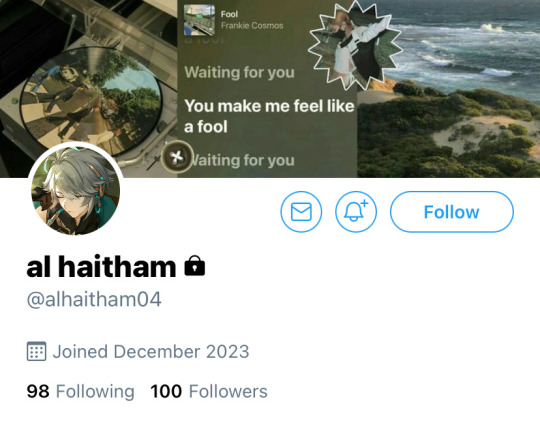



meet the support group! forced companionship because their childhood homes are literally in front of each other. they’ve been at it for YEARS. masterlist
al haitham: linguistics major. stereotypical kuudere but he’s just plain cold. rigid ass. into literature; has a book collection in his dorm (read: condo unit his uncle paid for) which takes up like 75% of his space.
kaveh: architecture major. popular w the girls and boys. somehow a member of every org in campus??? NEW JEANS STAN. insufferable kpop stan, actually.
tighnari: botany major. plant dad. plants. he just loves plants. owns a stan twt account that nobody knows of and he gets into petty fights with swifties (explains his amazing clapbacks against kaveh)
cyno: physics major. doesn’t know why he’s in physics. owns a meme account EVERYONE knows of. insufferable meme account owner.
#genshin impact#al haitham#genshin impact x reader#genshin impact imagines#genshin impact smau#genshin impact fluff#genshin impact angst#al haitham x reader#al haitham imagines#al haitham smau#al haitham fluff#al haitham angst
57 notes
·
View notes
Note
I am watching a video with criticism of geographical determinism in worldbuilding and realized that I don't really remember seeing any fictional stereotypic merchant state that relies on rivers.
Norse and Rus were whom I had in mind, but to my knowledge British and Japanese people also heavily utilized rivers for trade and I would be very surprised if Ancient Chinese people didn't.
I don't know about history of First Nations of North America and did they have trade in our understanding, but I heard that river system of North America is so convenient that the entire 19th century demand for transportation could have been covered by it alone, without trains.
Just some ideas
Freshwater systems are woefully underused in worldbuilding. The other day I was reading about the history of my region and I was amazed at how big and sophisticated native canoes were in the Paraná, the Paraguay and the Amazonas, and how virtually nobody talks about it. We are talking about ships that could hold about 30 people and some were bigger than Columbus caravels. For centuries into the colonial era, the Spanish and Portuguese hired or pressed into service native navigators for the rivers which were though to navigate as a sea. Still before that, they were the major arteries of commerce and trade through the continent, this is well known. Even Patagonian goods are reported in Corrientes (North of Argentina) which indicates that trade there got very far. As for the Chinese, not only rivers were important to the but also they boasted an amazing canal system but that's about all I know.
One thing I learned recently about rivers and cities is that cities were often founded on the side of rivers, yes, but almost never at their mouth. Look for example at Paris, Rome, London, the Egyptian capitals. They were founded by the river, but the mouth of the river next to the sea is where the delta is, and deltas always change and flood, carrying mud and slit, they aren't good places to build at all. Good river cities are built in the 'deep side' of the river where you can build ports, not in the side where sediment accumulates. Another issue with river cities are marshlands. For example, I remember reading that the marshlands of ancient Rome were drained at great cost. Ancient peoples knew that marshes were 'unsanitary' even if they didn't know why (it's because they host mosquitos and parasites, not because of anything bad wetlands have on itself) and they had to deal with them. There are some exceptions to this, like Venice which was basically built on a marshland (or the Netherlands).
And indeed rivers were (and still are! I see ships going up and down the Paraná every weekend!) a very efficient way of transportation. There's lots about it written in Europe, but river barges were basically the railroads of their time. Before the advent of railroads, people in Europe (and China) weren't thinking roads, but canals, the French built a lot of canals at great expense which became obsolete later by railroad.
Unfortunately the sources about river canoes and transportation in America (continent) are often tucked away in papers and history books, there really isn't that much accessible literature and illustrations about it. Which is a goddamn shame because learning about native canoes bigger than Spanish caravels (and they were still building them in Paraguay and Argentina during colonial times, according to my sources) blew my mind.
31 notes
·
View notes
Text

Trying to figure out why this is giving meme energy
And then trying to think of a meme to make with it,,, and I can't
#if you have suggestions#let me know#lol#dante#dante cosplay#cosplay#i'm just a silly little guy#er ... girl#dante alighieri#genderbend#genderswap#la divina commedia#stereotypical literature major#literature#italian literature#western literature#hehe#teehee#violently giggling#edit#meme
2 notes
·
View notes
Text
Ciel is Trans Theory
I Need to point this out because. I have a hunch that Ciel is Trans, and fingers crossed I’m right. Honestly, I could be completely off base and this could be as close as Ancient Aliens is to History.
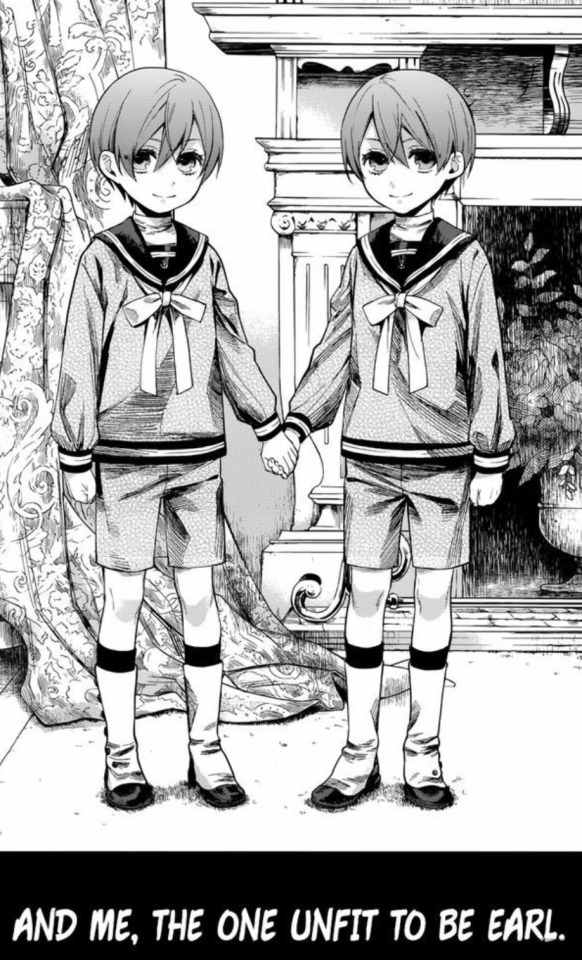
This might be an overreach but here is my case for it, as best as I can:
* Based on previous events and Chapters, Yana has shown that She Likes Playing on the concept of Gender from the Very First Arc. From the Very beginning we are introduced to a woman who is Jack the Ripper, challenging the male murder stereotype on its head, and her lover, a gender ambiguous (Later Confirmed Canonically!!) Trans Reaper Lady. Both unite from their desire, and hatred for the prostitutes who beg for abortions at her clinic. There are Already wombs being ripped out of women and we’ve just started.
* The Fact that Ciel is Dressed extremely effeminately not only for the period, even for EGL clothing standards might point to something as well. But when forced to wear a dress for the sake of a mission, he loses his mind. Although it could be a tween’s worst nightmare, how Madame Red laments to Ciel when dressing him as a girl that she always wanted a daughter feels like something.
* Ciel is always referred to as beautiful, which is not wrong for the period, but there are less masculine terms that people refer to him as.
* Yana herself says that she Over Masculinizes Ciel. Which is an interesting take for his effeminate nature of dress Vs masculine personality?
* Another hot take is that Yana Specifically has instructed in certain live action and anime for the voice actor to be a woman. I’ve seen a lot of talk on this particular conversation but none highlighting this as a clue on our Ciel’s Identity??? How??
* Mey Rin is also have been hidden as a boy with her previous life as a sniper, so this also shows that this is not out of the question either. The same reveal has happened with Doll.
* Ciel does not let anyone get close to his body. This is obviously because traumatic stress behaviors, however, similar flinching could allude to a different reason entirely.
* Our Lad introduces himself as the “Earl Ciel Phantomhive” Earl almost being apart of his first name. He’s already changed his name to hide his past. But Why?
* Let’s pretend that Ciel was in fact, born a boy at birth. If his brother and parents died, even if he was considered a “Spare Child”, (remember the British Phrase an Heir and a Spare). He would still be a legitimate hier due to his brother being unable to claim inheritance (because of his death) and pass on something to him. Even if another family member became a guardian and inherited a majority to raise our ciel, he would still be entitled to Something, and (might) even become Earl. This would Not be the case if Ciel was born a girl.
* Two Cultural similarities Japanese Manga and the Victorian period have in common are the troupe of “women disguising themselves as men”. I put this in quotes because, as Ciel described it, “the old him died in his cage,” pointing to metaphorical metamorphosis, and not simply a disguise for convient’s sake. Although it was common for (transgender men, queer cis women and/or Cis women) to take on a male position / pseudonym in order to establish a title, or a job position (typically in writing, this continued until the 1960’s). Now add on the popular manga/anime that were important in playing with perceptions of gender during Black Butler’s Debut (think Ouran High school host club), and there’s something there.
* The Fact that no one mourned Ciel’s Death was unfortunate, but a critical plot point of the story. Up until now, no one even acknowledged Our Ciel had ever Existed. Not a name, not “twins” nothing. Even though our Lad was an ill child, no one had even acknowledged he was there to begin with. Women and children were rarely recognized in Victorian culture, let alone a “Woman Child”. This culture was challenged somewhat through literature in the early ‘30’s with works from Jane Austen, ‘47 with Charlotte Brontë (who went by a pseudonym) and Lewis Carol’s Alice and the Looking Glass at the end of the century. (introducing a Girl Protag!! Gracious!). As sad as it may be, no one would really mourn an terminally ill girl compared to her family’s murder, unless having accomplished something amazing. It would be seen unfortunately as a lifted burden, and ultimately one less dowery or added expense. The fact that no one even bothered to notice our Ciel’s death or even the toll it might have on his twin is evident enough.

* The most Damning evidence I have for this theory is Lizzy’s reaction to figuring out “Ciel” was not the real “Ciel”. The immediate turn against Ciel. Why wouldn’t she even hear him out? What could have possibly turned her away like that, without a doubt in her mind, even if she had met with the Real Ciel? The fact that her reaction was not confusion but rather an extreme turn against him, she did not even think one minute to give Our Ciel a chance. And the only possible reason (combined with the fact that he was lying about not being his brother) is that if he was Not Cis. Not only would that mean that she was with the sick weaker sibling not heir to the Phantomhive legacy, but Ciel Could never conceive a family with Elizabeth, nor marry her like she would have wanted. And even if she married him, they would never be able to have children of their own (a really big obsession with British Aristocracy- modern day source: royals). All of her dreams would be shattered. And that shattering would bring her to turn instantly.
* The fact that everyone automatically assumed our ciel was real ciel, just based on saying so. Why?
* The fact that sick girls were often dressed like male counterparts to strengthen them during this era, as well as androgynous clothing for children being in fashion (because of less washing headaches and hand-me-downs)
* A smaller, minor detail is how Sebastian says “When lies become truth”. This is pointing towards both their façades but an interesting quote none the less on transitioning.
* I’m pointing to his teeny shoes with the high heels. It’s not that they’re effeminate women’s shoes that are iffy for the period, (which let’s be clear, they are) but. Look at him. Trying his best to be tall adult man. I’m pointing at his shoes.
* I might be missing a lot. Tell me if I am.
Reasons For Why I Am Extremely Wrong:
*Tanaka and Vincent referring to Our Ciel with he/him pronouns, (although I’m not sure on the original Japanese translation on chapter 131)
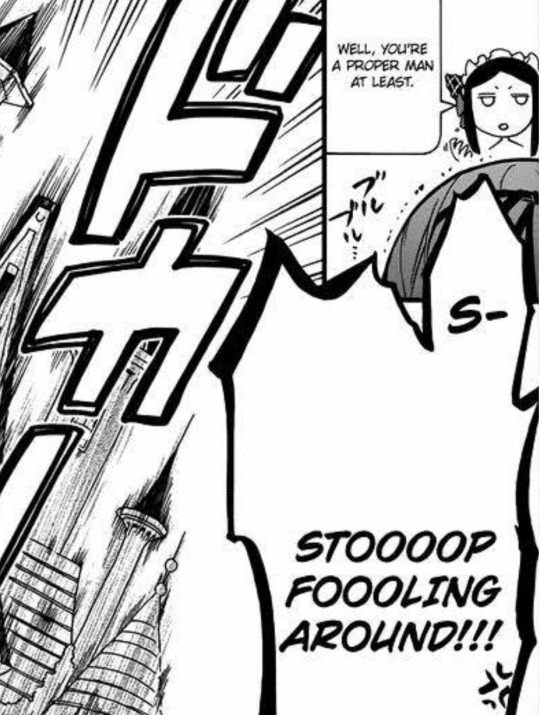
#black butler analysis#black butler theories#slaps Ciel’s Head#this bad boy can fit so many queer coding#I’m not writing this because I’m nb#But I’m not Not saying I’m writing this because I’m nb#i wrote this at 2am#please be gentle#Pepe Silvia board
39 notes
·
View notes
Text
Wicked And Worldbuilding (One Short Day)
The medicine journey is a stock storyline across a ton of literature and mythology. It's the hero's journey, but broader. The protagonist must go to a place (physical or metaphorical) to retrieve a thing (the medicine) and return home. Sometimes the medicine is enlightenment, or a secret suitcase with the MacGuffin the spies are all after, or even literally just medicine. The story focuses in on this journey.
The Wizard Of Oz follows this plot in a roundabout way, and its prequel, Wicked looks like it is doing the same. But Wicked is a satire, and so it takes this plot and twists it in a different direction. Before it can do that, however, it needs to plant its heroes in a new location.
Enter One Short Day, a song that is essentially just a transition piece to show the audience that the geography has changed. But this song manages to do a lot of worldbuilding for this place, and for some of the people who reside in it.
Let me explain.
SPOILERS AHEAD: (Wicked, Annie)
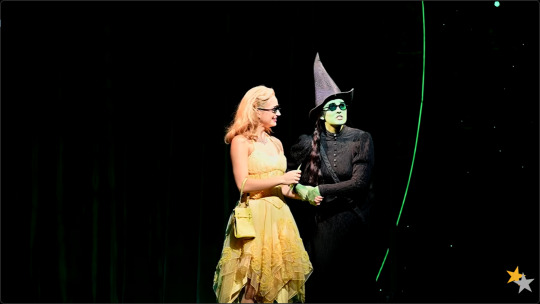
So... the Emerald City is New York City. Not explicitly, this isn't like Aslan, and the argument for the metaphor is shaky. I'm talking about vibes here.
Speaking as a non-American, New York has the stereotype of being "the big city", the place that is fast moving and cosmopolitan and chaotic in that way that you can't help but love. I don't know how well it lives up the image, but I'm guessing it's slightly more complicated.
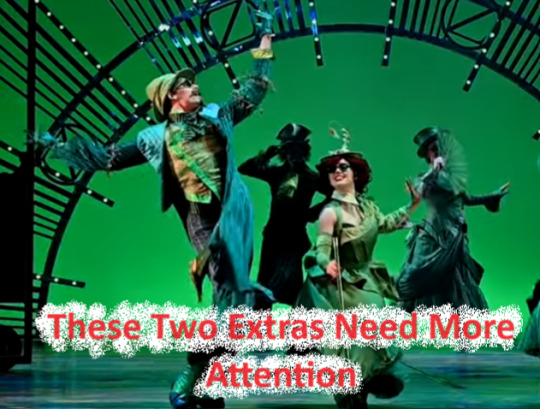
Anyway, that's what Oz is, that stereotype, but with complications. And just like any stereotype, the closer you look to it, the more it diverges, and we will get to that.
But first, you know why I associate this stereotype with New York? And why I associate the Emerald City with that stereotype? Annie, which has this exact song, but for New York.
For those who don't know, Annie is a 1977 musical and a half decent 2014 film about a billionaire named Oliver Warbucks who adopts an orphan for the hell of it. There is a lot more to it, but you don't need to know that for this post.
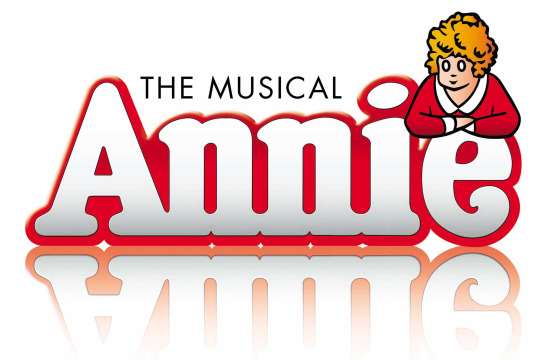
During the story, Warbucks decides to show Annie around New York, and the audience is treated to a song called N.Y.C, which has lyrics like this:
"The city's bright
As a penny arcade
It blinks, it tilts, it rings."
"To think that I've lived here all of my life
And never seen these things"
Compare that to the following from One Short Day:
"There are buildings tall as quoxwood trees"
"Dress salons"
"And libraries"
"Palaces!"
"Museums!"
"A hundred strong"
"There are wonders like I've never seen"
"It's all grand"
"And it's all green"
"I think we've found the place where we belong!"
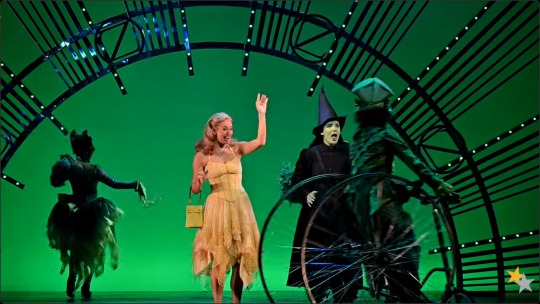
So, there's very much a common link between the two. You, the audience, are supposed to feel awe for this new place. The characters are small fish in the sea and everything has a sense of wonder.
But did you catch Annie's line in N.Y.C? "I've lived here all my life and never seen such things." Annie has some themes that, while not the focus, are far from subtext. In this case, New York City is a great and wonderous place... for rich people.
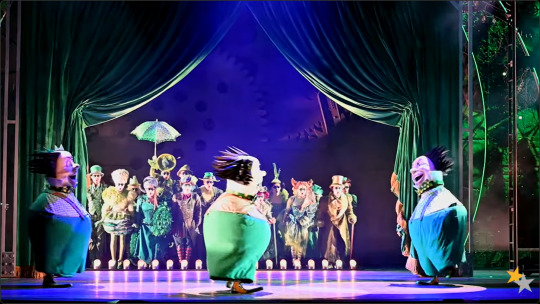
Wicked does this kind of thing a lot, because in this story, duality is a core tenet, and the first thing to talk about is the sycophantic nature of the citizens. Although that isn't exactly the truth, is it?
"Who's the mage
Whose major itinerary
Is making all Oz merrier?
Who's the sage
Who sagely sailed in to save our posteriors?
Whose enthuse for hot air ballooning
Has all of Oz honeymooning?
Isn't he wonderful?"
This doesn't read to me like spontaneous love for a leader, especially since the Wizard is established later to be looking into improving efficiency through a system of spies, and his second in command is his press secretary. Is it that far out of the question that this might be, in some way, propaganda?
That reflects on to the rest of the song. Oz is wonderous, but it feels fake. The actors are playing characters who are putting on a show by everything they do. All the citizens of Oz are living in a delicate balance of seeking popularity and coveting the popular. Everything is fake, and the fact that the real-life actors manage to get that across intentionally is really impressive.

I went to see the musical in Sydney twice (I knew one of the cast members), and the difference in performance between the first performance and the last was incredible. Not in terms of quality, but in terms of the emotions being conveyed. Most notably, Courtney Monsma's Glinda and Sheridan Adams' Elphaba changed from joy and wonder the first time, to the kind of disbelieving amazement of watching a drunk friend do something somehow both stupid as hell and genuinely impressive at the same time.
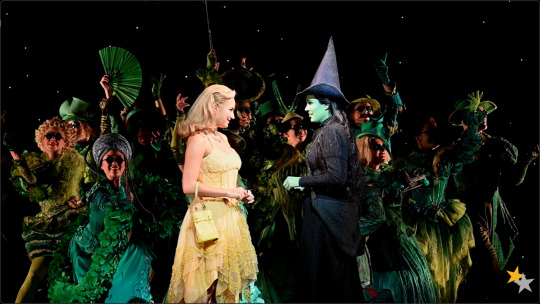
"We're just two friends."
"Two good friends."
"Two best friends"
Ah yes, the totally platonic and completely "just friends" maneuver of immediately relocating your entire life after your friend quietly asks if you want to come with them.
It is also notable that Glinda is the one standing out in this place. This is Elphaba's world, and Glinda is highlighted in it in gold. Just something to point out.
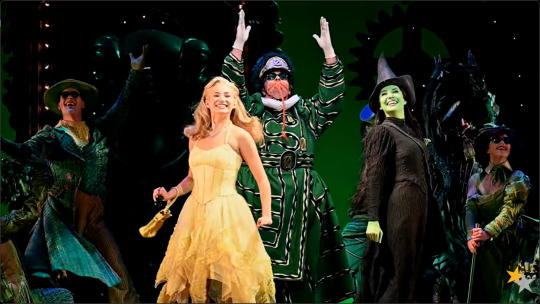
But, back to the worldbuilding, I think its important that Elphaba fits in here, because Wicked is a story about dreams and reality colliding, and part of that is Elphaba's dream of belonging, and freedom from ridicule. It feels important to the gut punch that she comes so unbelievably close to getting what she wants, but it isn't her that's the problem here, its the falseness of the Emerald City and Oz as a whole.
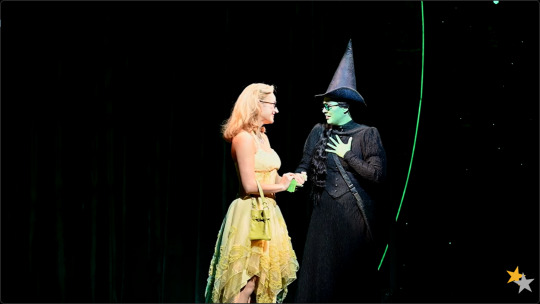
"You look positively emerald."
Suddenly, Elphie is in a place where green is a compliment. This is the defining abnormality, the thing that everyone, even her father, used as an insult.

And if you want something incredible to drive home this point, in the books, the Emerald City isn't even green. The outer wall is green, but the inside only looks that way because everyone is wearing mandatory tinted glasses make it look that way. The Emerald City's name is a lie. Everyone is just so caught up in the moment that they don't notice. It's like rose tinted glasses, but emerald.
The green-ness is actually fascinating, because the colour is usually associated with sickness and evil, but the story has been chipping away at that association through Elphaba's entire deal. So, the thematic of a specifically green city is confused, and I don't actually know what to take away from that.
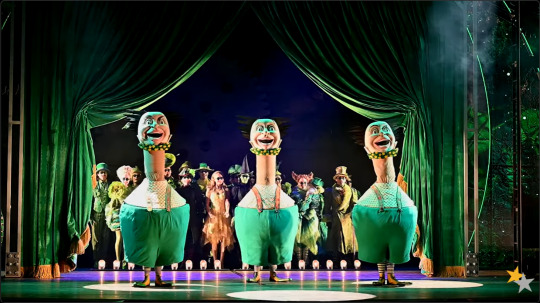
Also, the Wizard dancers look like... well I'm not going to explain what they look like because I want to keep this vaguely PG. But suffice to say this: It is a cool piece of visual storytelling that, under all the facade of heroism and wisdom and magic, the wizard is barely more than a bellend with a bow tie.

Final Thoughts
I have a completely irrational love for this song, derived entirely from my time performing this musical back in high school. I was the guy at the end who shouted, "the wizard will see you now", and that's all it took to get me to like it.
The song still isn't my favourite, however. I'm going to keep y'all guessing about what that is until we get there.
Next week, I will be looking at Sentimental Man, a song that deconstructs the musical's idea of truth. So, stick around if that interests you.
Previous - Next
#rants#literary analysis#literature analysis#character analysis#what's so special about...?#wicked#wicked the musical#wicked musical#emerald city#one short day#gelphie#lgbtq
36 notes
·
View notes
Text
The Home Theater
Satan
"I don't remember the House of Lamentation having one of these," MC notes as they take in their surroundings. "Whose idea was it to put one here?"
"It was mine," I answer. "Barbatos helped me set everything up. All the equipment, the acoustics...it's all top-notch."
"By human world standards, or Devildom ones?" I've forgotten how observant they are. MC seems to enjoy taking in all sorts of information, even if it seems insignificant to other people. That's one of the things I like about them.
"According to the employee at DevTech--I mean, Best Buy--we have the top-of-the-line equipment, and the quality is comparable to some of ours." I hate that I keep swapping human world names with Devildom ones. I personally feel like I'm better than that.
"Have you guys used it yet?"
"Funny that you mention that, because we just started a zombie movie marathon last weekend."
"Was that your idea as well?" I nod my head.
"The idea of zombies has interested me for a while now. While there are diseases and curses that can induce a zombie-like state in demons, it's usually a temporary problem that can be solved with medicine. That doesn't seem to be the case with humans."
"Are you solely basing that on our movies?"
"Of course not. I've also read books."
"Fiction or non-fiction?" Oh, I'm about to blow their mind.
"Both, actually."
While the human world seems to focus on the fantastical elements of zombies, the Devildom has meticulously recorded all zombie outbreaks that have occurred throughout the centuries. You see, sometimes a human zombie accidentally stumbles in the Devildom, and we have to deal with that situation properly in order to prevent chaos.
While we've certainly dealt with the stereotypical zombies--the ones that are slow-moving, crave brains, and are more or less dead--those aren't the only ones that we've come across. Some are capable of sprinting, others aren't too keen on brains, and there's even those that appear perfectly fine on the outside but have some kind of parasite in their brain that's making them carry out orders with no thought whatsoever.
Although, sometimes the parasite doesn't have a physical form and is instead created as a result of rather intense brainwashing.
"I see," MC states once I've completed my mini lecture. "Somehow, that's never come up in any of my classes."
"That's because you've only taken general knowledge ones. RAD offers majors, and with those comes specific classes for particular areas of study. Although, in order to declare a major, you have to prove that you have a solid understanding of the fundamentals first, since you might get pulled to teach a class or two."
"Has that ever happened to you guys?"
"Lucifer and I are the only ones out of our bunch that have declared a major. Belphie's been offered, but he doesn't want to deal with the responsibility of teaching, so he just takes whatever interests him. The others simply haven't proven themselves yet. Levi struggles with attendance, and Beel has difficulty concentrating. As for Mammon and Asmo, I think they're content with where they're at right now, so they're not going to push themselves too hard."
"What do you and Lucifer major in?"
"He does potions and curses. I focus on history and literature. Somehow, despite my sin, I tend to be a more patient teacher than him. At least, that's what I've heard from other students."
"That's really interesting." MC appears deep in thought. "Do you think I could major in something?"
Honestly, I don't know how to answer that question, mainly because we've never had beings outside the Devildom attend RAD before Diavolo implemented the exchange program. It wouldn't surprise me if he did allow MC and the others to declare a major eventually, but I don't know how long that would take. Would MC be alive by then? Or be in a good physical and mental state to take in additional knowledge, let alone teach an entire classroom? Personally, I think they have the best chance out of the initial exchange students of eventually declaring a major, but that isn't for me to determine.
"That would be something to ask Diavolo. I don't think I'm qualified to answer that question." MC nods their head.
"So, changing the subject...wanna watch a movie together?"
"Like, right now?"
"Yeah!" I sigh.
"As much as I would like to, I doubt the others would be happy if I kept you all to myself before they've even had the chance to say hi to you. I will have to take your offer some other time."
"Sounds good. I'll try to find a good movie for us to watch together in the meantime."
"You bring the movie, and I'll whip up something nice for us to eat." MC snorts in amusement. "Do you not think I'm capable of cooking, MC?"
"It's not that at all. Just reacting to an idea I had, that's all."
"What kind of thought?" Interesting. My question has made them tense up all of a sudden. Usually they only get that way if someone catches them doing something that they think they're not supposed to do. Like fiddling with strange objects.
Or having dirty thoughts.
I keep coming across the phrase "Netflix and chill" in the media I've been consuming, and it appears to be referring to hooking up with someone as a movie's playing in the background. Is MC wanting to do that with me?
Are they afraid I'd find the idea silly? Because I don't. I mean, if it was something that I was invested in, then I'd want to pay attention to whatever was playing, but I'm more than capable of choosing something that I can tune out as I focus on something else.
Especially if that something else happens to be MC.
I lean in closer to them to whisper,
"You know, I went ahead and assembled a collection of movies I thought you'd like." I plant a kiss right below MC's ear, making them shiver slightly. "I really enjoyed picking them out, actually." I begin moving down their neck. "It was fun thinking about what might appeal to you. There are so many genres that are worth exploring."
#obey me shall we date#obey me mc#obey me satan#welcome to me randomly creating lore that wasn't there before#was not what i intended to do at all#in fact#i thought of it on the spot as i was writing this#like some other things that i've posted#in my head it makes some degree of sense#i mean#how do you keep individuals like lucifer and satan interested in going to school#both of them are extremely intelligent after all#basic classes just wouldn't satisfy them#also#i know the whole 'satan assembles a movie collection for mc' is canonically innocent#however#i felt like adding a bit of spice to it
36 notes
·
View notes
Note
I definitely think there are people who use those "diverse reading challenges" to show off, but I also think you can have a truly genuine desire to diversify your reading habits, and challenges can be a good way to incentive yourself to do that and keep track of it. And I'm not sure there's a go-to standard for who is "tryhard" beyond if they act cringey and show-offy about it on social media. I was going to say something like "do they genuinely seem like they're trying to branch out, or just reading the same things as they usually do but with a black lead" - but honestly, I want the people who are "just reading YA" or "just reading romance" or whatever to read more diversely, too. Like for romance readers specifically: Read more romance with COC or written by POC, read more M/M and/or F/F if you primarily read het, read more stuff written by people from outside of North America and Western Europe, etc. And if you primarily read serious "classic" literature, try reading one from Africa beyond the lit-class staples like Things Fall Apart rather than another white British author, just to give an example. I think everyone should do more of that. I think those can all come from a genuine desire to try new things, not just show off to your followers about how open-minded you are.
Actually, I think the big way to tell if someone's being "tryhard" is, yes, their reaction on social media, but particularly how they talk about the book when they're done. The one big Tell I see on Goodreads about people who want to be seen as "reading diversely" but don't really appreciate diversity is when they read a book about, say, Muslim characters and then leave a 2-star reviewing whining that they didn't like that the book expected them to know 101-level things about Islam like what Ramadan or the hajj is. (Or alternately, are mad that it DID explain that stuff "too much," oblivious to the fact that in Christian-majority cultures, that's a publisher expectation that you do that with any other religion, because of ignorant readers who will whine if you don't spend a paragraph teaching them what Ramadan is because apparently these supposed "diverse readers" can't be assed to learn literally anything about the best-known Muslim holiday.) I saw someone complain on Tumblr about Goodreads reviewers getting mad at all the "Jewish stuff they were expected to know" to read Naomi Novik's Spinning Silver, and this person was like "I'm a goy and I understood all of it because it's stuff you would know just from having seen Fiddler on the Roof. If all the Judaism you need to know for a book is stuff that you can get from watching Fiddler on the Roof, then maybe the issue is not the book, it's you for not having such basic information about a major world religion and then reading a book about it."
Or as another example, when people complain about how the particular set of lingo this person who is oppressed in a way you are not used to describe their oppression is not the exact thing that Twitter discourse has told you is "correct" to use or that it is offensive. When they get mad that a book where a black person is talking about their life experience with police brutality has "too many descriptions of violence" and "I'm rating this lower because it might be triggering." (In general, when people seem to conflate "this triggered me" with the kind of "productive discomfort" that relatively privileged people NEED to confront in fiction about marginalizations they don't experience in order to grow as humans. But also it's just like... there are some topics where it would be doing readers a disservice not to describe them graphically. Not everything can be communicated in a way that would earn a G rating on AO3. That might mean the book is inaccessible to you, but that's on you to deal with, not on the author to censor themselves.) Or when they, as in the American Fiction example, expect it to fit some stereotypical ideas of "authenticity" and are mad that this POC or LGBTQ+ or disabled person's lives are more like their own rather than feeling like a museum exhibit about an exotic Other culture.
To me, "tryhard" is when you don't actually value diversity FOR diversity. If you're going to read diverse media, you can't get mad when it actually is diverse. If you want to read about stuff about/from other cultures and identities, then a) you need to be okay with being challenged, b) you need to not expect the author to hold your privileged hand all the time. You can look up unfamiliar words like "hajj" or "Purim." It's 2024. You have a tiny computer in your hand that is several times more powerful than the big computers that put astronauts on the moon. You can use it to go to Wikipedia when you see a word you don't understand, it's not that hard! Expecting authors from other cultures and identities to patiently explain every aspect of that to you like an elementary school teacher is the ultimate sign of entitlement and privilege, especially if you're reading, say, a book by a Congolese author about the Congo, not one that they wrote specifically for Western audiences!
When people make a big show of reading "diversely" but then seem to be upset that those books are actually, you know, DIVERSE, that's a big flashing sign that it's performative tryhard nonsense to me.
--
It's pretty sad when we'll go google some xianxia thing to watch The Untamed, but we can't manage to look at a ten thousand times more commonplace wikipedia article on a major world religion.
41 notes
·
View notes